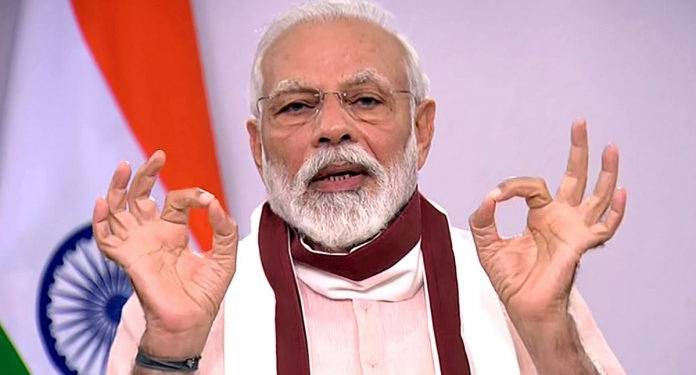In his 8 PM address on Tuesday, Prime Minister Modi laid the foundations for a “quantum jump” in the Indian economy by pushing India towards self-reliance and announcing that it is time for making global brands out of India’s domestic products. He said, “Every Indian has to become vocal for their local, not only to buy local products, but also to promote them proudly.”
Prime Minister Modi’s version of protectionism amidst the COVID-19 crisis is aimed at making India the hub of global manufacturing, as opposed to the ideology of isolationism of the Nehruvian era. And he is turning the Coronavirus crisis into an opportunity to promote local products like never before, because PM Modi understands that the present world order offers once in a lifetime opportunity to push local manufacturers.
Countries that have become manufacturing behemoths and superpowers have all had a certain degree of protectionism in domestic policies to make the local firms globally competitive. This idea is not lost on PM Modi either, who said, “Global brands began locally. But when their people started marketing, branding and praising, they became global. Every Indian should become vocal for local. Don’t just buy, but promote.”
https://twitter.com/harshmadhusudan/status/1260553796926619648
It was not possible in a free trade regime of the pre-Coronavirus world order that requires developing countries to fall in line with free trade policies that kill any initiative of formulating some degree of protectionism aimed at encouraging local manufacturers to assume the shape of global brands.
But the global dynamics have changed in view of the Coronavirus Pandemic and also a dysfunctional WTO trade disputes settlement system following Trump administration’s impulsive decisions against the perceived bias of the WTO. A parallel adjudication body has been set up consisting of major stakeholders like Australia, China and the European Union, but it can decide disputes only among the members of the makeshift arrangement.
Prime Minister Modi has thus decided to push local manufacturers along with a plethora of bold labour and land reforms by the state governments. The government plans to offer tax incentives and procurement preference in government contracts to local manufactures, and in fact, the Union Home Ministry has already decided that all the Central Armed Police Forces (CAPF) canteens that cater to lakhs of CAPF jawans and officers, will now sell only locally manufactured goods.
Moreover, the Union Finance Minister Nirmala Sitharaman has also announced that the tenders for government procurement will no longer be open for foreign companies in case of projects worth up to Rs. 200 crores. The Finance Minister said that she wants to create a level-playing field for Micro, Small and Medium Enterprises (MSMEs) by eliminating “unfair competition” from foreign firms.
The states are also likely to be asked to overhaul their procurement process giving preference to domestic manufacturers, and according to ET Now, the government might be considering imposing certain severe non-tariff barriers to deter imports.
As the government plans to go local and create a level-playing field for domestic manufacturers, the government might also want to promote local Kirana stores and markets, and e-commerce giants like Amazon and Flipkart, which discriminate between retailers despite being third party platforms, could feel the heat.
What also makes the government believe that domestic manufacturers can take India on the course of self-reliance is the fact that the idea of self-reliance is what helped India sail through during the Pandemic.
PM Modi said, “When the Corona crisis started, there was not a single PPE kit made in India. The N-95 masks were produced in small quantity in India. Today we are in a situation to produce 2 lakh PPE and 2 lakh N-95 masks daily. We were able to do this because India turned this crisis into an opportunity.”
He is looking to use this sentiment for bolstering domestic manufacturers. Moreover, the government is all set to buy 50,000 ‘Made-in-India’ ventilators through the PM CARES fund. A medical supplies industry has emerged out of nowhere and it is pushing the government to create an ecosystem that encourages domestic manufacturing.
#PMCaresFund Trust Allocates Rs. 3,100 crore for fight against #COVID19
▪️ Rs. 2,000 crore for 50,000 ventilators
▪️ Rs. 1,000 crore for relief measures for migrants
▪️ Rs. 100 crore for vaccine development@narendramodi @airnewsalerts @PMOIndia @JPNadda @ImAvinashKhanna pic.twitter.com/3Wyvo3edTc— Jamyang Tsering Namgyal (Modi Ka Parivar) (@jtnladakh) May 14, 2020
In a pre-Coronavirus world, any measure of protectionism and promotion of local industries would have become a matter of international outrage. For example, when India’s BHIM and UPI were gaining traction even without any bias against foreign firms, Mastercard and Visa, who were miffed with Prime Minister Modi, had lodged protest with the United States arguing that PM Modi was using nationalism to promote indigenous digital payment systems.
However, with a dysfunctional WTO trade dispute settlement system and a push for self-reliance across the world amidst the Coronavirus Pandemic, including in the Arab world and the European Union. This is the best opportunity to encourage local manufacturing and promote domestic manufacturers, and PM Modi has grabbed it with both hands.




























